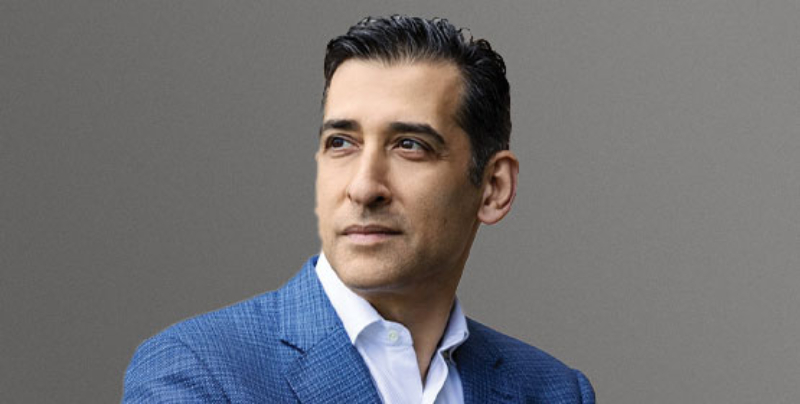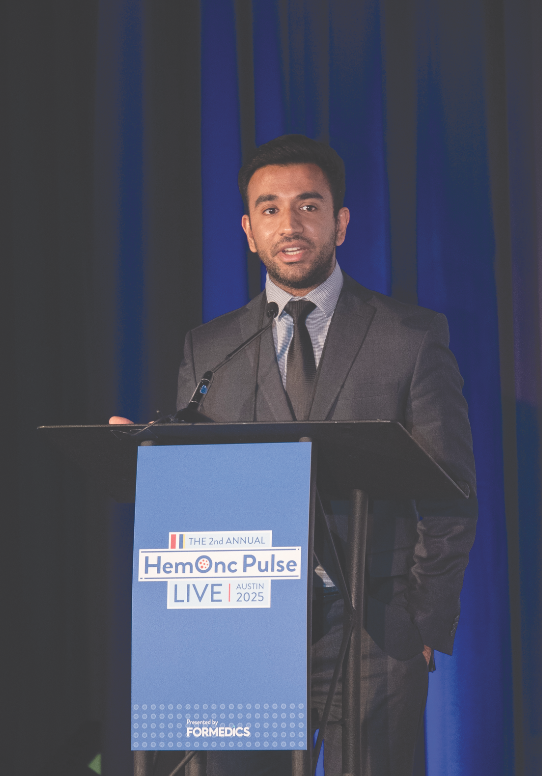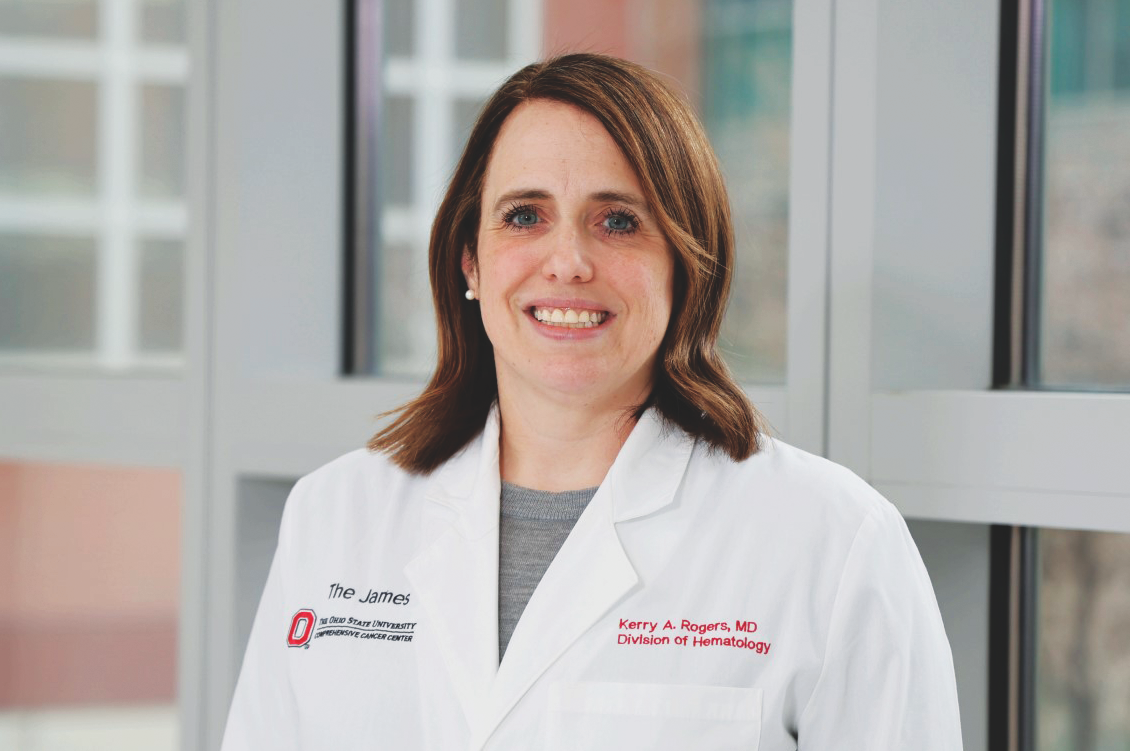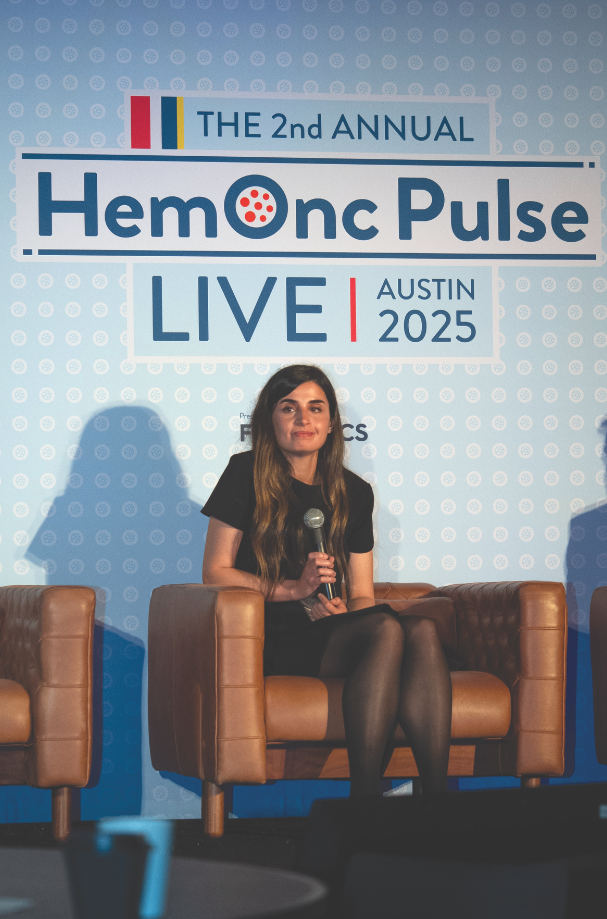
Chadi Nabhan, MD, MBA, FACP, a hematologist and medical oncologist and the host of The HemOnc Pulse, a podcast from Blood Cancers Today and the Society of Hematologic Oncology, hopes to put clinicians treating hematologic malignancies out of a job in five years with the help of precision medicine.
Listen to all available episodes of The HemOnc Pulse now.
What led you to pursue a career in medicine? I never thought I was going to be in medicine. I grew up thinking I was going to be a journalist. I’ve always enjoyed journalism, but I wanted to be an investigative journalist or one who can write a story that causes that has significant impact on policy and politics.
I grew up in Syria and I did very well in high school. My dad said, “Well, you should apply to medical school because it’s very competitive. You can still do journalism on the side as a hobby.” I did, and I started loving it and started loving the human connection of things.
Stories are the link between journalism and medicine. Every patient that you interact with has a story, and we all are going to be patients at some point, if we haven’t been already, so we all have these stories. It’s about the human connection with people and being able to understand what they went through. Frankly, there is nothing more honorable than someone trusting you at their most vulnerable time in life. Human connections and impact on patient lives are what led me to pursue medicine as a career in the end.
You’re prominent on social media, you’ve written a book, you host several podcasts. What led you into working in scientific and medical communications? Social media really started as a hobby. I can tell you that the reason I joined Twitter was because I was on the board of a non-for-profit organization for patients with Double Hit Lymphoma Foundation. The foundation was created by the wife of a patient who was diagnosed with this disease, and I joined the board of that organization. She told me I must join Twitter because I can help educate people about the foundation, about the disease, and potentially I can help raise funds that could be dispersed to help patients diagnosed with this illness. That was the reason I originally joined social media. Then, I realized that there are a lot of people on social media that are like-minded who I could learn from and have a conversation with about medical topics.
I started enjoying the community that I was building around me and getting to meet people that otherwise I would’ve never met because you’re always limited by where you work and geography. But social media really breaks all these barriers, and suddenly you could be communicating with someone who lives in Japan and collaborating with someone who lives in Europe. That is really what attracted me to the social media component. I started doing podcasts in February 2019, and decided on topics helpful to listeners, and mainly focused on medical topics of relevance. I view myself as almost a reporter when I’m doing the podcast. I try to report the facts, what’s happening in the medical community, and what’s on the minds of people who are in the medical circle.
Can you talk about the launch of The HemOnc Pulse? This was a new podcast that I have the privilege of hosting. We wanted to create a podcast that is dedicated to the world of hematologic oncology, which has become complex when it comes to the type of diseases that physicians are dealing with, and the therapeutics that are required to be used or that physicians need to be aware of. There are other elements of hematology that are important from a health care policy perspective. How do you manage coordination of care with complex therapies like CAR T-cells, how do you navigate drug prices, and how do you make care more affordable to patients?
We named it The HemOnc Pulse because I envisioned that this podcast will be how physicians, students, fellows, residents, patients, families, researchers, investigators—everybody—can keep their fingers on the pulse of what’s happening in the world of hematologic oncology.
How do podcasts and social media help disperse the information clinicians need? It goes without saying that the world of hematologic oncology has become complex. How do you keep up with all the information that is coming out—because you need to. Ultimately, there are patients that you care about and you want to make sure you are up to date with all the information. People consume information differently. You may, for example, like to watch a TV show or webinar. Some people like to read a book, and others like to listen to an audiobook. Some people like to do all, depending on what they’re doing, they’re busy, they’re driving, etc. People consume information differently.
This podcast is for folks who really prefer to consume information by listening. We spend a lot of time on a plane, walking, and driving. A lot of times you just want to listen to music and something fun, but every so often you really want to just try to make better use of your time and you want to listen something more educational, and hopefully if you are in that mood, you think about this podcast and you click on it.
We’re going to also solicit feedback on the podcast because our goal is to refine it to be aligned with what our stakeholders expect of us.
What do you most hope that listeners take away from your podcasts? I say if you listen to the podcast and you leave the podcast knowing more than when you started listening, then the podcast is successful. Even if it’s one piece of information. You start listening and by the time you finish, you learned a couple of things that you did not know before you started listening. Then, to me, this is successful.
What do you see as the major financial challenges in the treatment of hematologic malignancies? How can academia, industry, governmental authorities, and other entities work together to address these challenges? I’ll start with the second question first. They must work together. The idea that one entity can work on its own to improve the outcomes of patients with cancer is completely unrealistic, and I think it is shortsighted because we all need to work together to improve the outcomes of patients. I think the challenges of hematologic malignancies are multiple, but it is important to look at the cost of therapy. It is important to try to understand the affordability of treatment because if there are therapies that are very effective, but patients cannot take these treatments because they are too expensive, patients will not benefit. Part of this is we have to look at the cost.
The other piece that I think is important, as many treatments are becoming oral therapies, is what measures we can implement to improve the adherence to oral therapies because it is not always easy to adhere to the treatment. I think we must create metrics to make sure that the patients adhere to it. The third piece is the logistics. Some of these treatments are complex, require treatment inpatient, outpatient, in clinic, and outside of clinic. Navigating a complex health care system is difficult.
You are largely focused on precision medicine in your research and your work. Can you tell me a little bit about how you became interested in precision medicine? We’ve always thought the most important or the easiest way to define precision medicine is treating the right patient with the right drug at the right time. This is precision medicine. If you think about it, this is what doctors do all the time. It’s not like we treat patients randomly. We treat patients with the right drug at the right time. What has changed is that we understand the disease better now. We understand what drives the disease much better than before. We understand the molecular underpinning of the disease and what is really making the cancer grow, what is making the cancer cells be different than normal cells. By knowing these things, you can be smarter and more effective in designing a treatment against that type of disease.
You’re still treating the right patient with the right drug at the right time, but what has changed is that you know more about how to treat, when to treat, and why to treat. Precision medicine, in my view, implies more and better understanding of the actual cancer and what drives it. Precision medicine is about knowing the foundation of that cancer.
What are your biggest hopes in precision medicine as it relates to hematologic malignancies over the next say, five years? I want all doctors treating hematologic malignancies to be unemployed. My goal is to hopefully get them all out of a job where they can go golfing and fishing, and we cure all hematologic malignancies. Is it feasible? I don’t think so. I think that is really wishful thinking, but I do think we will be able to make patients live longer and better. That is the ultimate challenge: what can we do together as a community for patients to live longer but also better. Because it’s not about the quantity of life, it is also about the quality of life. If we’re able to do that, then we have all succeeded as a community and we all need to work on that together.
What do you do in your free time? My passion is to write, and I love to read. I used to read a little bit more, but time has been very difficult. I like to get through one book a month. I think for avid readers, that’s probably not a lot. My goal has always been 12-15 books a year. I think the more you read, the better you write. So, my passion is reading and writing —and of course—podcasting.
Is there anything we haven’t talked about that you’d like to tell our readers? Be sure to check out The HemOnc Pulse. I think it’s going to be well worth their time, and I look forward to hearing their feedback and what we could do better to accommodate their expectations.
Chadi Nabhan, MD, MBA, FACP, is a hematologist and medical oncologist and the host of The HemOnc Pulse, a podcast from Blood Cancers Today and SOHO. You can follow Dr. Nabhan on Twitter @chadinabhan. He is also the creator and host of the podcast “Healthcare Unfiltered” and the author of Toxic Exposure: The True Story behind the Monsanto Trials and the Search for Justice. Dr. Nabhan serves on the editorial board for JAMA Oncology.






 © 2025 Mashup Media, LLC, a Formedics Property. All Rights Reserved.
© 2025 Mashup Media, LLC, a Formedics Property. All Rights Reserved.